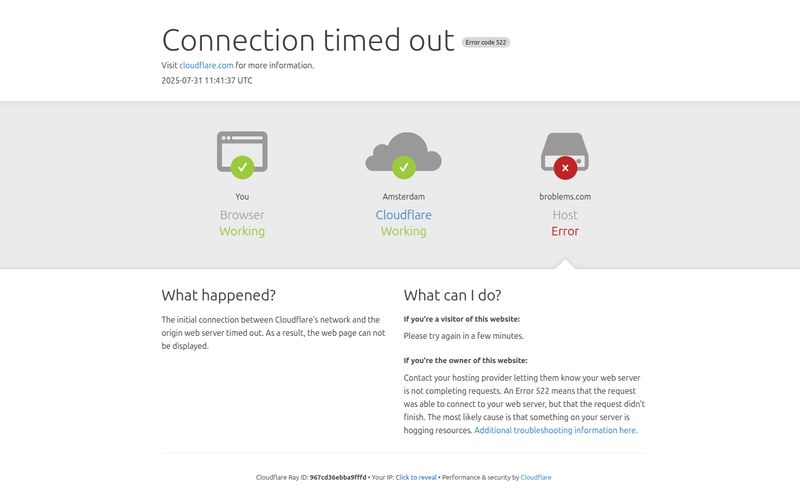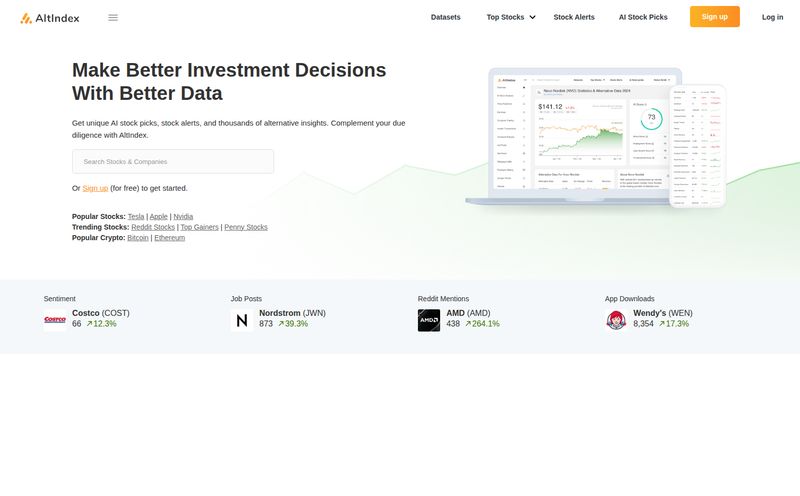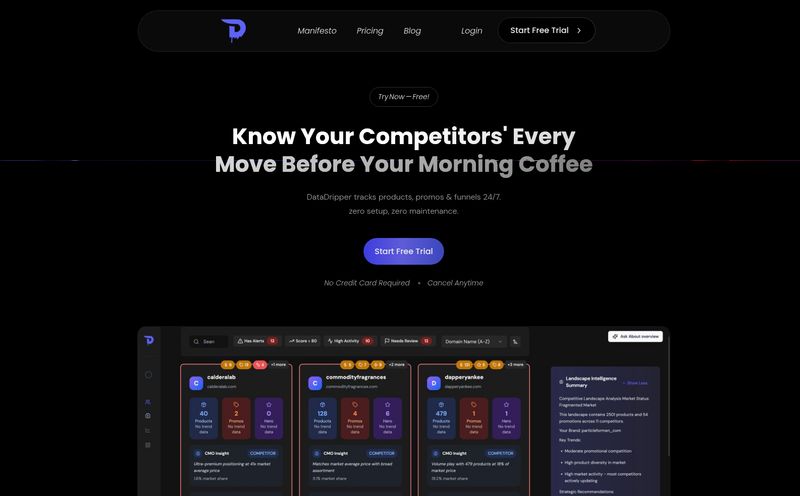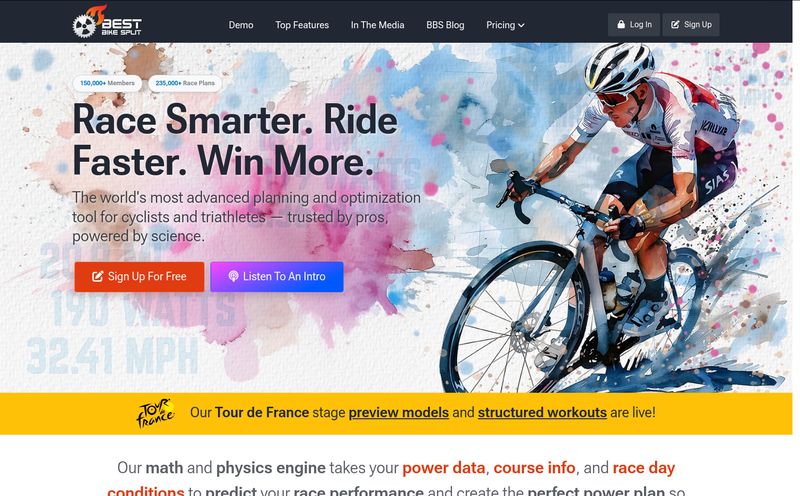If you're in product, UX, or marketing, you're probably drowning in data. Not the neat, tidy quantitative stuff, but the messy, glorious, human stuff. User interview transcripts, open-ended survey responses, support tickets, Slack messages, sales call notes… it’s a chaotic symphony of customer feedback.
For years, my process was a Frankenstein's monster of Google Docs, spreadsheets, and a thousand digital sticky notes. I’d spend hours, sometimes days, trying to manually tag themes and find the golden nuggets. It was tedious, prone to bias, and honestly, a bit of a soul-crushing experience. You know the feeling. You've got all this incredible feedback, but turning it into actionable intelligence feels like trying to assemble a ship in a bottle. During a hurricane.
Then I started hearing the buzz about Dovetail. It calls itself a “customer insights hub,” which sounded a little corporate-jargony at first, but the promise was tantalizing: one place for all that messy data, with AI to help make sense of it all. So, I did what any data-obsessed professional would do. I dove in.
So, What Exactly is Dovetail, Anyway?
Think of Dovetail as a central library for every single thing your customers say, think, or feel. But this library has a ridiculously smart AI librarian that doesn't just shelve the books; it reads them all, finds the connections between them, and gives you a summary. It's designed to take raw, unstructured data—from interviews to sales calls—and help you transform it into organized, shareable insights that actually influence decisions.
It’s built for teams who need to understand the why behind user behavior. We're talking Product Managers trying to prioritize a roadmap, UX Researchers building empathy, and even Sales teams wanting to understand customer pain points on a deeper level. It’s about moving past spreadsheets and into a collaborative space where customer knowledge lives and breathes.
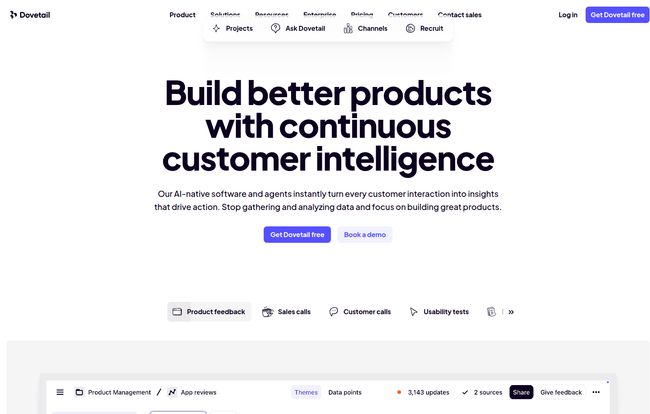
Visit Dovetail
My Favorite Dovetail Features (The Good Stuff)
A tool is only as good as its features, right? After spending some quality time with it, a few things really stood out to me as game-changers.
The Centralized Hub: Your Single Source of Truth
This is the core premise and, in my opinion, its biggest win. The sheer relief of having one place to send everything is hard to overstate. You can upload audio and video files from user interviews and Dovetail will transcribe them (pretty accurately, I might add). You can pull in survey results, connect it to Zapier to funnel in feedback from other tools, and even use their 'Channels' feature to automatically pull in things like support tickets. Suddenly, the data isn't siloed in ten different apps across three different departments. It’s all in one searchable, analyzable repository. It’s the end of the “Wait, where did we save that feedback from Sarah?” scavenger hunt.
Let's Talk About the AI Magic
Okay, this is where it gets really interesting. Dovetail's tagline is “Data in, intelligence out,” and its AI features are the engine behind that. It automatically suggests tags and themes from your data, which can be a huge time-saver. It’s not perfect—you still need your human brain to refine things—but it’s an incredible starting point for thematic analysis. The real star of the show for me is the “Ask Dovetail” feature. You can literally ask questions of your entire research repository, like “What are the biggest frustrations our users have with the onboarding process?” and it will comb through everything to synthesize an answer, complete with sources. It’s like having a junior researcher on call 24/7.
Collaboration That Actually Works
Research that lives and dies on one person's laptop is useless. Dovetail is built for teams. You can highlight snippets of text, add tags collaboratively, and leave comments for your colleagues. When you discover a powerful insight, you can package it up into a shareable report or story, complete with video clips and quotes. This makes it so much easier to get buy-in from stakeholders. Instead of just telling them about a user problem, you can show them, with a real customer’s voice. It integrates with Slack and Microsoft Teams, too, so sharing those moments of discovery is seamless.
A Look at Dovetail's Pricing Plans
Alright, let’s talk money. Pricing can be the make-or-break factor for any tool, and Dovetail has a few tiers to consider. I've found their pricing page to be pretty transparent, which is always a good sign.
| Plan | Price | Best For |
|---|---|---|
| Free | $0 | Individuals or very small teams just getting started with formal research. It's a great way to test the waters. |
| Professional | $15 per creator/month (billed annually) | The sweet spot for most professional teams. This unlocks unlimited projects and transcription, plus key collaborative features. |
| Enterprise | Custom Pricing | Large organizations that need advanced security, SSO, dedicated support, and other enterprise-grade features. |
They also have a couple of powerful add-ons: Channels (at $50/month) for automatically piping in data from other sources, and Recruit ($75 per participant) for finding people for your studies. My take? The free plan is generous enough to really get a feel for the tool. The Professional plan is where the real value is for any serious team, and the per-seat price is pretty competitive in this space.
The Not-So-Perfect Bits (A Reality Check)
No tool is perfect, and I wouldn't be giving you an honest review if I didn't mention the downsides. First, there's a definite learning curve. This isn't a simple notes app; to get the most out of it, you need to invest some time in understanding how to structure projects and use the analysis features effectively. It’s powerful, but it’s not exactly a pick-up-and-play experience.
Second, while the per-seat price is reasonable, the cost can add up quickly for larger teams, especially if you start adding on features like Channels. For small startups or non-profits on a shoestring budget, it might be a bit of a stretch.
Finally, and this is a big one, you have to be mindful of the reliance on AI. The AI is a fantastic assistant, but it's not a replacement for a human researcher's critical thinking and domain knowledge. You still need to guide it, validate its findings, and bring your own interpretation to the table. Don't just copy-paste the AI summary and call it a day.
Who Should Use Dovetail? (And Who Can Probably Skip It)
So, who is this for? I’d say Dovetail is a fantastic investment for any organization that is serious about being customer-led. If you're a product team, a UX research team, or a customer success team that conducts regular qualitative research and feels the pain of data silos, Dovetail could genuinely change your workflow for the better. The ROI report they feature on their site—showing a 236% ROI—feels plausible when you consider the amount of manual analysis time it saves.
Who might not need it? If you're a solo founder who gets maybe a handful of feedback emails a month, it's probably overkill. If your work is almost purely quantitative, you won't use most of its core features. And if your budget is absolutely zero, you might have to stick with the spreadsheet-and-doc method for a little while longer, though the free plan is still worth checking out.
Final Thoughts: A Bridge Over Troubled Data
Look, the struggle to make sense of customer feedback is real. We collect all this rich, valuable information, and then it dies a slow death in a forgotten folder. Dovetail acts as a bridge over that chaotic sea of data. It brings structure to the unstructured and speed to a traditionally slow process.
It's not a magic wand—you still have to do the work of talking to users and thinking critically—but it’s an incredibly powerful partner in that process. For teams ready to move beyond basic tools and build a real, scalable practice around customer insights, I think Dovetail is one of the best options on the market today. It's a serious tool for serious teams who want to build better products. And in my book, thats a worthy investment.
Frequently Asked Questions about Dovetail
- 1. Is Dovetail only for UX researchers?
- Not at all! While UX researchers are a core audience, it's incredibly useful for product managers, designers, marketers, and customer success teams—anyone who needs to understand customer feedback to do their job better.
- 2. How good is Dovetail's AI analysis really?
- It's surprisingly good as a starting point. It's great for quickly summarizing long transcripts and suggesting initial themes. However, it's best used as an assistant. You'll still need a human to review, refine, and add the crucial layer of strategic interpretation.
- 3. Can I use Dovetail for free forever?
- Yes, Dovetail offers a free plan that is not a timed trial. It has limitations (e.g., one creator, limited transcriptions), but it's perfect for individuals or for trying out the platform's core functionality before committing.
- 4. What kind of data can I put into Dovetail?
- A whole lot. You can upload audio and video files, text documents, spreadsheets, and notes. With integrations, you can also pull in data from survey tools, support ticket systems like Zendesk, and even Slack conversations.
- 5. Does Dovetail integrate with other tools?
- Yes, it has native integrations with tools like Slack, Zoom, and Zapier, which opens up connections to hundreds of other applications. This is key for creating an automated feedback pipeline.
- 6. Is Dovetail difficult to learn?
- There is a learning curve to master its more advanced features. It’s more complex than a simple notes app, so expect to spend a little time getting familiar with how to set up projects and use the analysis tools effectively to get the most value.
References and Sources
- Dovetail Official Website
- Dovetail Pricing Information
- The Total Economic Impact™ Of Dovetail Report (For ROI stats)
